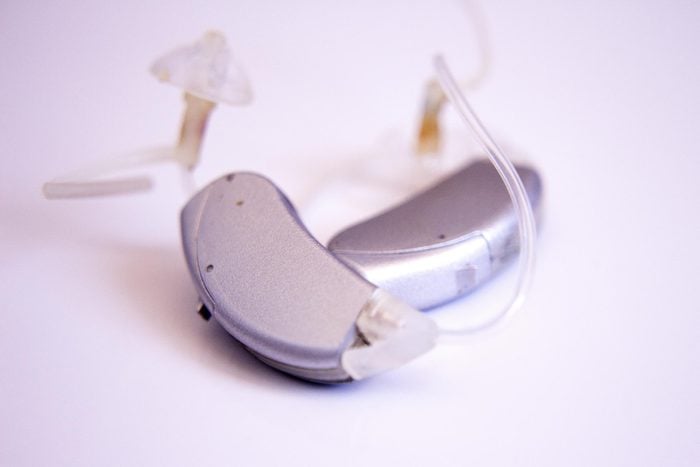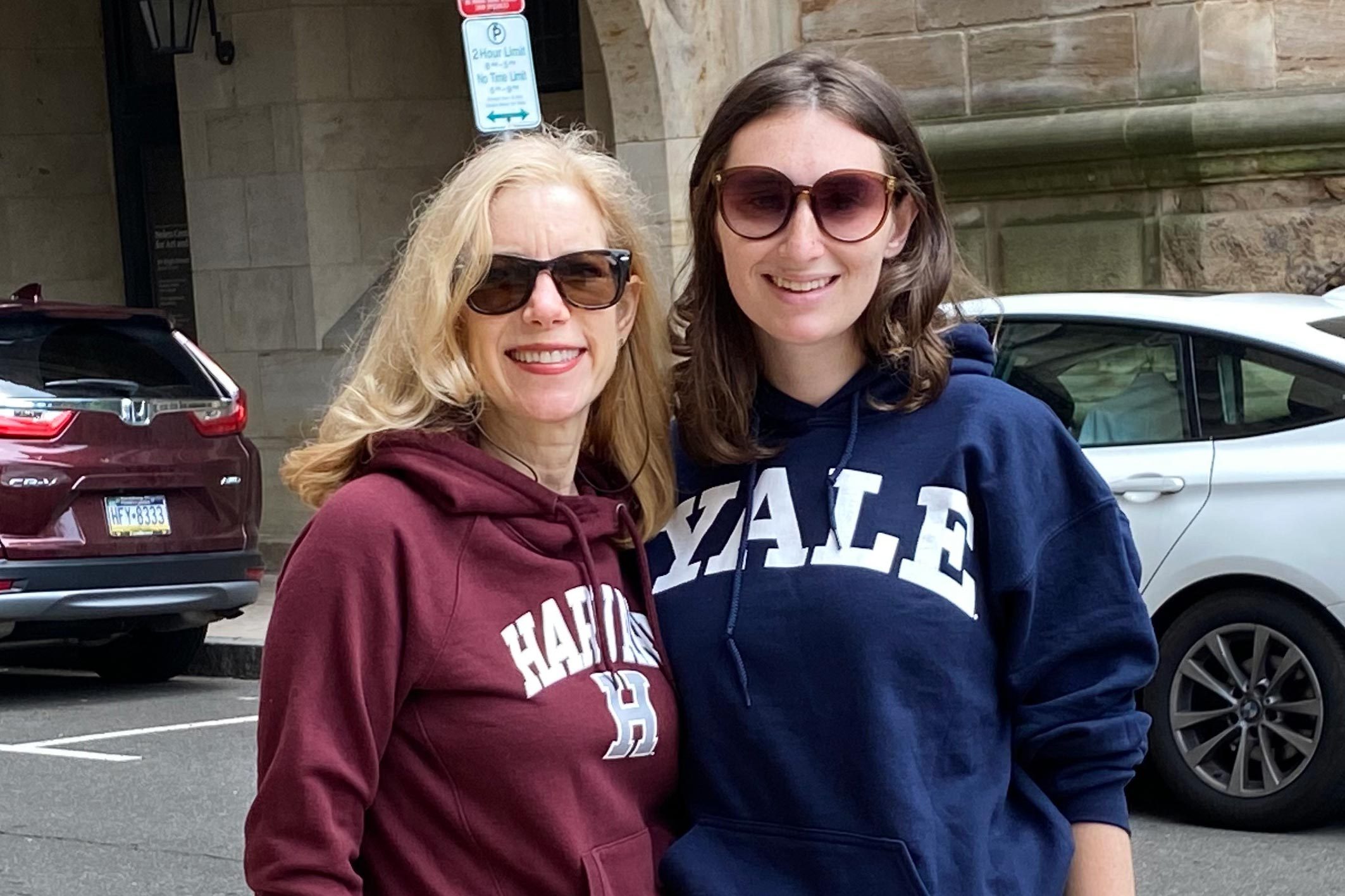Hearing Aid Accessibility: A Mother’s 25-Year FDA Fight, and What Needs to Happen Next
Updated: Dec. 01, 2022

When her daughter was diagnosed with hearing loss 25 years ago, Janice Lintz waged a fight for more affordable hearing aids. August's announcement from the FDA on greater hearing aid accessibility is proof that they've finally been heard.
A mother’s determination
By Janice Lintz, as told to Denise Mann
“Your daughter has hearing loss—but don’t worry, there are special schools she can attend.”
This was the response our pediatrician gave me after I’d spent months trying to figure out why my toddler didn’t seem to be developing speech. For months, we’d visited one professional after another who’d pretty much all responded to me as though I were simply being a hysterical, overreactive mother.
“A special school?” I asked. Of course there were schools for children who are hard of hearing; and living in a city, I didn’t doubt we’d be able to access a good one. But what about all the other experiences in her life? This would affect her experience of things like concerts and movies, of friendships and laughter with our family. When I felt like most of the professionals brushed us off with a shrug, I refused to accept their nonchalance.
That was in 1996. Today, my daughter is 28 years old and finishing her master’s degree at her second Ivy League university. It took almost 25 years, but after the August 16 announcement that the U.S. Food and Drug Administration (FDA) would make hearing aids available without prescription in October, I finally feel like my advocacy as a mother has made a difference in the world.
Only 14 Percent of People With Hearing Loss Use Hearing Aids. This Is a Major Health Crisis.

The price of hearing loss
Hearing aids can dramatically improve the hearing and speech comprehension of people who have hearing loss, like my daughter. They currently cost an average of more than $2,300 per ear, and my daughter’s cost $8,000!
I couldn’t understand why these devices were so pricey, and they aren’t covered by most health insurance plans or basic Medicare. Hearing aids are unaffordable for so many people in the U.S. and globally.
During a check-up with my daughter’s audiologist, I was told that there were no longer any hearing aids that would work for her. I was shocked to hear this and didn’t take no for an answer. Turns out, there were hearing aids available that would have helped my daughter, but this particular audiologist didn’t sell them. Instead, she recommended a cochlear implant. She was motivated by profit, and her suggestion meant my daughter would undergo an invasive, life-altering surgery that would have required months or years of recovery.
It was also impossible to compare hearing aids because of the way they were sold—including proprietary names for features—which prevent comparisons, especially since there are no rating systems for features. Further, the limited number of U.S. companies who sell them prevents dramatic innovation. How was this even happening in the U.S?
This oligopoly had to be disrupted, and who better than Sen. Elizabeth Warren (D-Mass.) to help make that happen? She was the perfect person to disrupt this industry, just as she’d done with credit cards. I attended a talk she presented about the credit card industry at Roosevelt House Public Policy Institute at Hunter College in New York City. I’ve found that when it comes to my child, I never get nervous approaching anyone. I am mission-driven. I will ask anyone and everyone for help. In fact, I once wrote a letter to the Queen of England asking her to make Buckingham Palace more accessible for people with hearing loss…
…And you know what? They did.
15 Inspiring Moments for People with Disabilities
Sen. Warren was very receptive. She introduced the Over-the-Counter Hearing Aid Act with Sen. Chuck Grassley (R-Iowa) in 2017, and Congress passed it as part of the FDA Reauthorization Act. The FDA was charged with issuing regulations for over-the-counter hearing aids no later than three years from the date of enactment. The FDA finally did this last fall, more than four years after the Over-the-Counter Hearing Aid Act was signed into law.
Now, certain types of hearing aids are available over the counter to Americans with mild to moderate hearing impairment. Sadly, the new law won’t benefit my daughter, but I am hoping this is the start of further changes.
The FDA will also take steps to ensure over-the-counter hearing aids meet the same high standards as all medical devices at a lower cost. I recently testified at public comments to make sure this legislation passed. I was the only consumer there who wasn’t paid to speak. I even paid my own expenses to get to the hearing! What is disappointing is that the FDA didn’t mandate generic names for features or standard I testing for performance. I am unclear how the FDA will know if a device is labeled “false or misleading” if they aren’t testing the hearing aids.
This bill will have a domino effect globally, since hearing aids will decrease in price due to more players entering the market. Making hearing aids affordable around the world is critical. Several years ago, I visited a school for children with hearing loss in the Nasarawa state of Nigeria as part of a gubernatorial delegation and was disheartened to learn that the school didn’t test or fit these kids for hearing aids for the simple reason that even if they were accurately diagnosed their families can’t afford the devices. Over the years, I’ve learned time and again that it wasn’t just my child, but so many children globally who live with hearing loss. A foundation donated hearing aids, but costs are still an issue for so many other children globally who don’t have access to proper hearing aids.
5 Silent Signs of Hearing Loss You May Be Ignoring
Fighting the good fight
My daughter had no preconceived notions of what she could or couldn’t do. I didn’t either. A teacher of the deaf once told her that she couldn’t study French because of her hearing loss. Also not one to take no for an answer, my child asked her school’s headmistress what students with hearing loss do in France. My daughter now speaks fluent French. She’s a powerhouse.
It so happens that I’m trained as an attorney, so over the years I have spent lots of time and energy fighting with the New York City Department of Education (DOE) to make sure she received all the services that she needed and was entitled to under the law.
12 Simple Ways to Be More Inclusive of People with Disabilities
At one point, I was told she could not receive audiology services. These essential services help identify and troubleshoot any issues in the classroom for kids with hearing loss. The woman told me that the City changed the State statute on this and no longer provided audiology services.
But she didn’t realize who she was dealing with. I went from Mom to Attorney Mom and gently explained in no uncertain terms that the City can expand the services provided by the state, but it can’t narrow them. I advised her she had until the end of that day to revise my daughter’s Individualized Educational Plan (IEP) to include audiology services. She did.
We eventually stopped using DOE services, since she was in a private school. However not everyone has that option, which has given me additional motivation to keep fighting all these years.
14 Effective Tinnitus Cures to Try If You Have Ringing in Your Ears
The fight for wider accessibility
Making sure hearing aids are available over the counter was an important part of my mission, but there’s more I’ve done and lots more to do…always. I’ve worked to make sure that museums, public transportation, sporting arenas, theaters, and amusement parks offer assisted hearing devices called induction or hearing loops, which provide access to facilities for those who use a hearing aid or cochlear implant. I also helped push to have closed-captioning available for in-flight entertainment and create captioning standards, starting with approaching Richard Branson of Virgin Atlantic at the World Economic Forum. From there, his team partnered with me.
I have worked for 15 years to add induction loops to the Smithsonian museums. I will never give up.
I am also working to ensure the National Park Service offers induction loops across all parks, not on a park-by-park basis. The Kimbell Art Museum in Fort Worth, TX, is also on my list. I am working to have the Office of Management and Budget add procurement codes for induction loops to its procurement list so government agencies will bid for the specific access, instead of relying on contractors to decide what access to use. My key to not growing too frustrated and exhausted is to always work on multiple projects at once.
Today, as a graduate student at the Harvard Kennedy School in Boston, my goal is to figure out systemic issues that are preventing people with hearing loss from advancing in society. My daughter and I will actually graduate within two days of one another next summer. Her hearing loss did not define who she is, but I suppose it did define who I am. The limitations she’s overcome have emboldened me to break the silence for millions of people globally.
The FDA’s new regulation doesn’t fix everything. We still need generic names, ratings, and performance testing with standards from the American National Standards Institute (ANSI). But, it’s progress. My fight as a voice for my daughter has taught me that if one person keeps speaking long, loudly, and passionately enough…then little by little, the world will hear.
For more inspiration follow The Healthy on Facebook, Instagram, and Twitter. Keep reading:
- My Young Husband’s ‘Mental Illness’ Turned Out to Be Dementia
- Ashton Kutcher’s Vasculitis: What Caused It, and Can It Be Cured? A Harvard Doctor’s Take
- Here’s What Neil Patrick Harris Ordered on His First Date with David Burtka
- Have Acne, Eczema or Psoriasis? Know This About Your Monkeypox Risk, and a Doctor’s Prevention Tips
